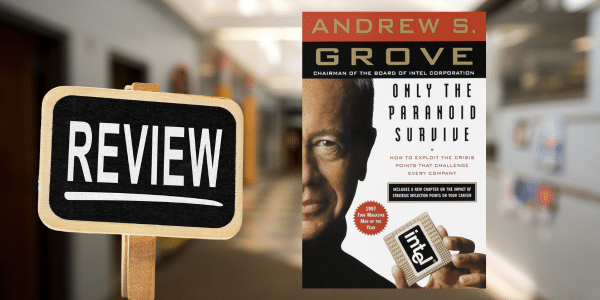Strategic Vigilance: “Only the Paranoid Survive” Book Review
As it relates to business strategy and leadership, “Only the Paranoid Survive” by Andrew Grove stands as a seminal work that advocates for a mindset of perpetual vigilance in the face of rapid change. Grove, a former CEO of Intel, shares his insights on strategic inflection points—moments when the fundamentals of a business are upended.
I hope you enjoy this book review of “Only the Paranoid Survive” by Andrew Grove. Let’s dive into the key insights and takeaways from this instructive guide to navigating the challenges of a dynamic business landscape.
If you would like to get your hands on the book, click here to read it.
1. Strategic Inflection Points: The Catalysts of Change
At the heart of “Only the Paranoid Survive” is the concept of strategic inflection points—events or developments that fundamentally alter the competitive landscape of an industry. Andrew Grove argues that these points are moments of both vulnerability and opportunity. Companies that fail to recognize and adapt to strategic inflection points risk obsolescence, while those that navigate them successfully can thrive in the midst of change.

Grove emphasizes the importance of being paranoid about potential inflection points and continuously scanning the business environment for signs of impending disruption. According to Grove, this vigilance is essential for leaders and organizations to survive and thrive in an ever-evolving marketplace.
2. The 10x Rule: A Framework for Action
Andrew Grove introduces the 10x Rule (no, not the same as what Grant Cardone preaches) as a framework for responding to strategic inflection points. The rule advocates for actions that go beyond incremental adjustments, urging leaders to consider responses that are ten times more significant than what might seem immediately necessary. The 10x Rule is a call for bold, decisive actions to meet the magnitude of the challenges presented by inflection points.
By adopting the 10x Rule, companies can position themselves not just to weather the storm but to emerge stronger on the other side. Grove provides case studies from Intel’s own experiences, illustrating how the company applied the 10x Rule to successfully navigate strategic inflection points in the semiconductor industry.
3. Organizational Learning: Adapting to Change
“Only the Paranoid Survive” underscores the importance of organizational learning as a critical component of adapting to change. Andrew Grove argues that companies must cultivate a culture of continuous learning and a willingness to challenge existing assumptions. Leaders, according to Grove, should encourage open communication and create an environment where employees feel empowered to voice concerns and propose innovative solutions.
The book emphasizes that the ability to adapt and learn collectively as an organization is a critical factor in surviving strategic inflection points. Grove contends that companies that foster a culture of curiosity and adaptability are better equipped to navigate uncertainty and thrive amid disruption.
4. The Crisis as a Leadership Tool: Turning Adversity into Advantage
Andrew Grove explores the concept of using a crisis as a leadership tool, framing challenges as opportunities for growth and transformation. Instead of viewing crises solely as threats, Grove suggests that leaders can leverage them to drive organizational change and innovation. By embracing a crisis as a catalyst for action, leaders can mobilize their teams and steer the organization in a new direction.
Grove provides examples in “Only the Paranoid Survive” of how Intel turned challenging situations into opportunities for strategic repositioning. The ability to perceive crises as opportunities, according to Grove, requires a shift in mindset—one that sees adversity not as a sign of failure but as a signal to reassess and reinvent.
Related Content: Redefining Stereotypes & Success in “Billionaires & Bodybuilders”
Think along the lines of a brand like Netflix. Netflix was built off of DVD rentals and pivoted into streaming services. You can look at Slack, which started with games and moved into team communications. They both took adversity and turned it into an advantage that has worked out in their favor.
5. Turning the Flywheel: Building Momentum in Change
The concept of turning the flywheel is central to Grove’s approach to managing strategic inflection points. The flywheel represents the cumulative momentum generated by consistent and strategic actions. Grove argues that companies should focus on building momentum over time, using each strategic move as a lever to propel the organization forward.
By turning the flywheel, companies can create a self-sustaining cycle of positive change and adaptation. Andrew Grove emphasizes that the key is not to view strategic inflection points as isolated challenges but as part of an ongoing process of evolution and improvement.
Conclusion: Navigating the Paranoia for Success According to Andrew Grove
“Only the Paranoid Survive” by Andrew Grove is not just a cautionary tale about the dangers of complacency; it’s a guide for leaders and organizations to thrive in an era of constant change. Through the exploration of strategic inflection points, the 10x Rule, organizational learning, crisis as a leadership tool, and turning the flywheel, Grove provides a roadmap for navigating the challenges of a dynamic business environment.
In conclusion, “Only the Paranoid Survive” challenges leaders to adopt a mindset of strategic vigilance, recognizing that success requires a perpetual readiness to adapt and evolve. Grove’s insights, grounded in real-world experiences at Intel, offer valuable lessons for leaders seeking to steer their organizations through the complexities of a rapidly changing marketplace. Through the principles outlined in the book, readers are invited to embrace the paradox of paranoia as a driving force for innovation, resilience, and enduring success.
Click here to get “Only the Paranoid Survive” by Andrew Grove.
Check out some of our other book reviews that you may be interested in:
- Relentless (Tim Grover)
- Your Next Five Moves (Patrick Bet-David)
- Crush It! (Gary Vaynerchuk)
- The 10X Rule (Grant Cardone)
- Rework (Jason Fried)
- The Halo Effect (Phil Rosenzweig)
- Built To Last (Jim Collins)
- The 4-Hour Workweek (Tim Ferriss)
- Atomic Habits (James Clear)
- Can’t Hurt Me (David Goggins)
- Jab, Jab, Jab, Right Hook (Gary Vaynerchuk)
- Good To Great (Jim Collins)


*Disclosure: This article may contain affiliate links or ads, which means we earn a small commission at no extra cost to you if you make a purchase through these links. These commissions help support the operation and maintenance of our website, allowing us to continue producing free valuable content. Your support is genuinely appreciated, whether you choose to use our links or not. Thank you for being a part of our community and enjoying our content.
PLEASE CONSIDER SHARING THIS ON YOUR SOCIAL MEDIA TO HELP OTHERS LEARN MORE ABOUT THIS TOPIC.





